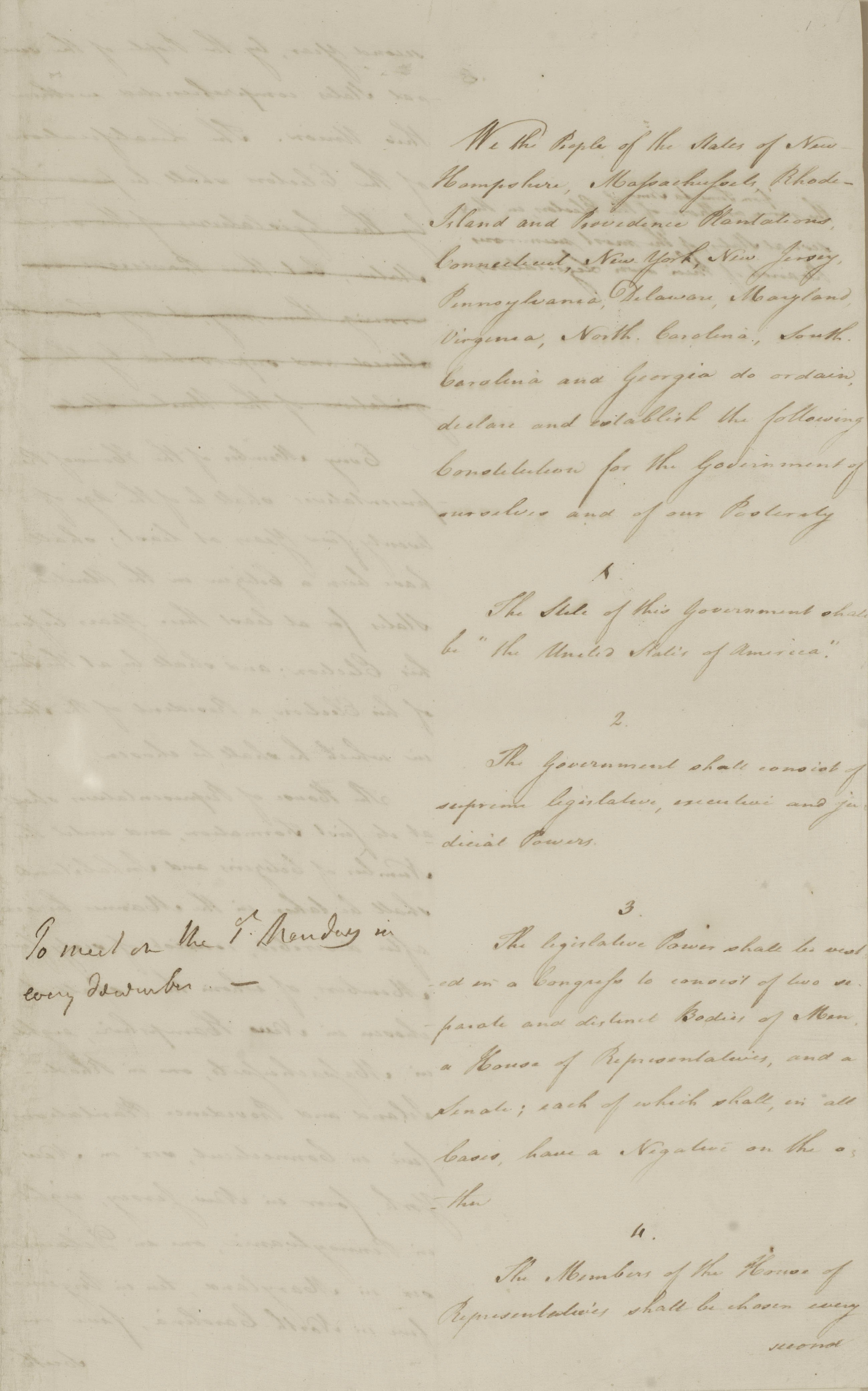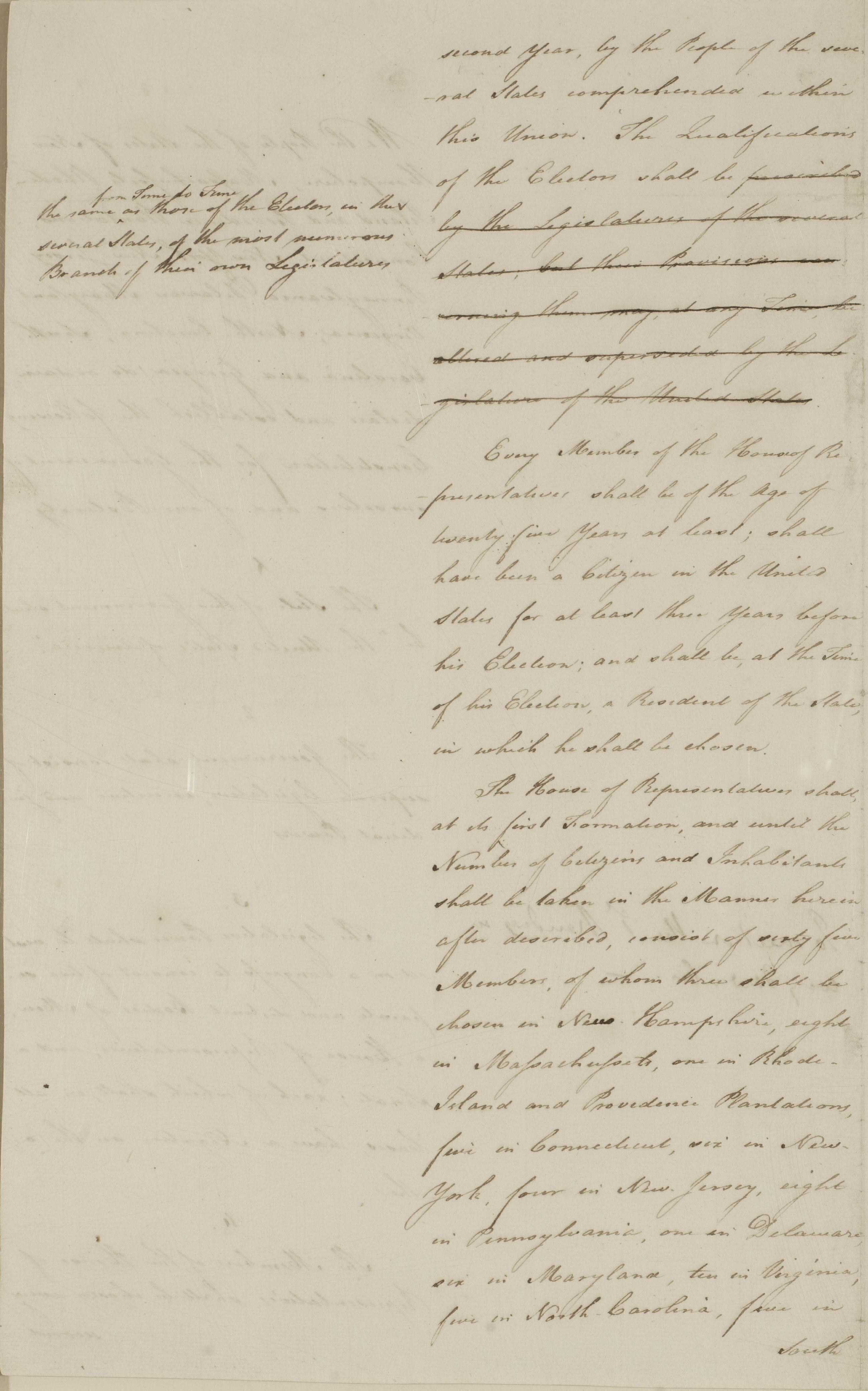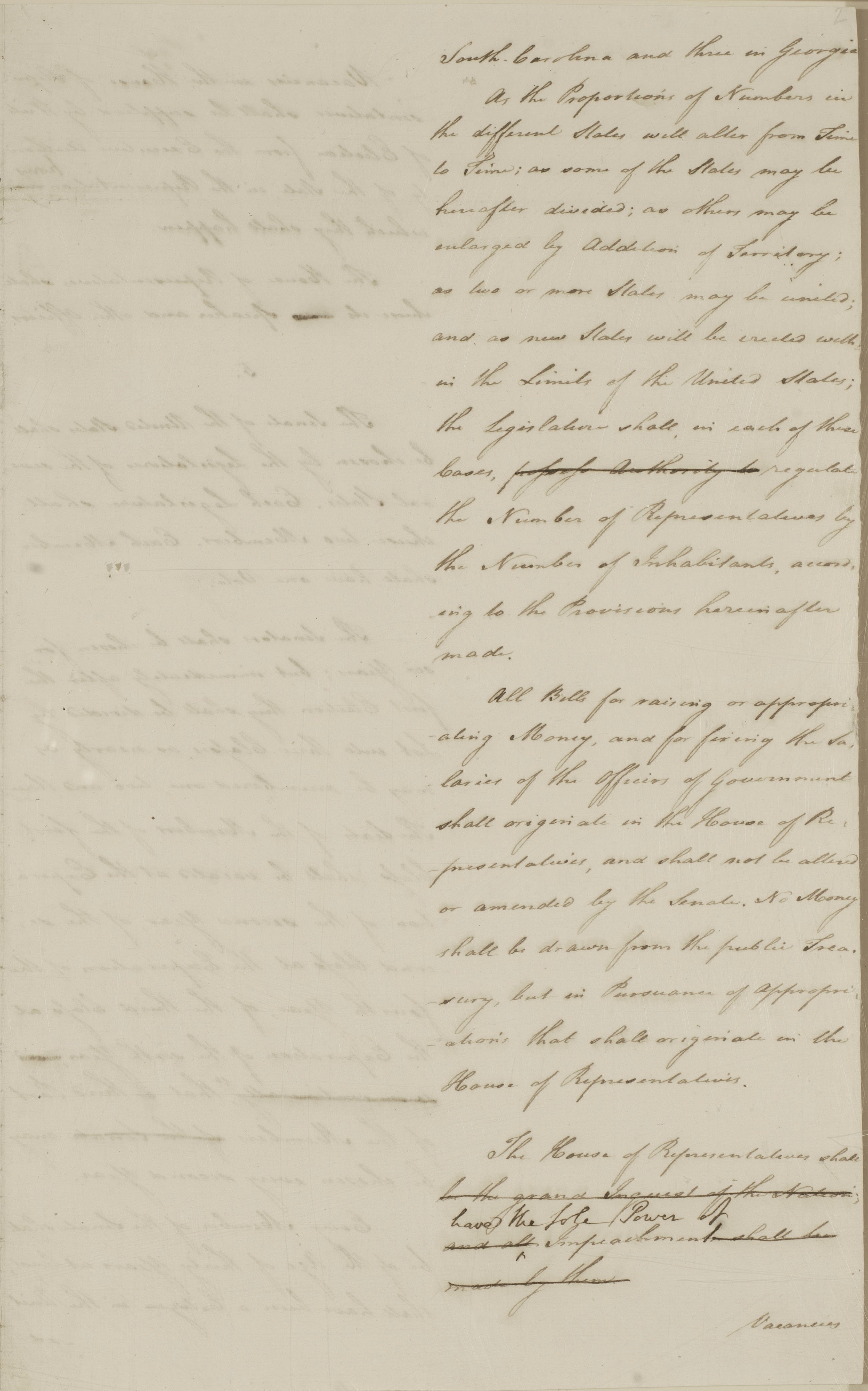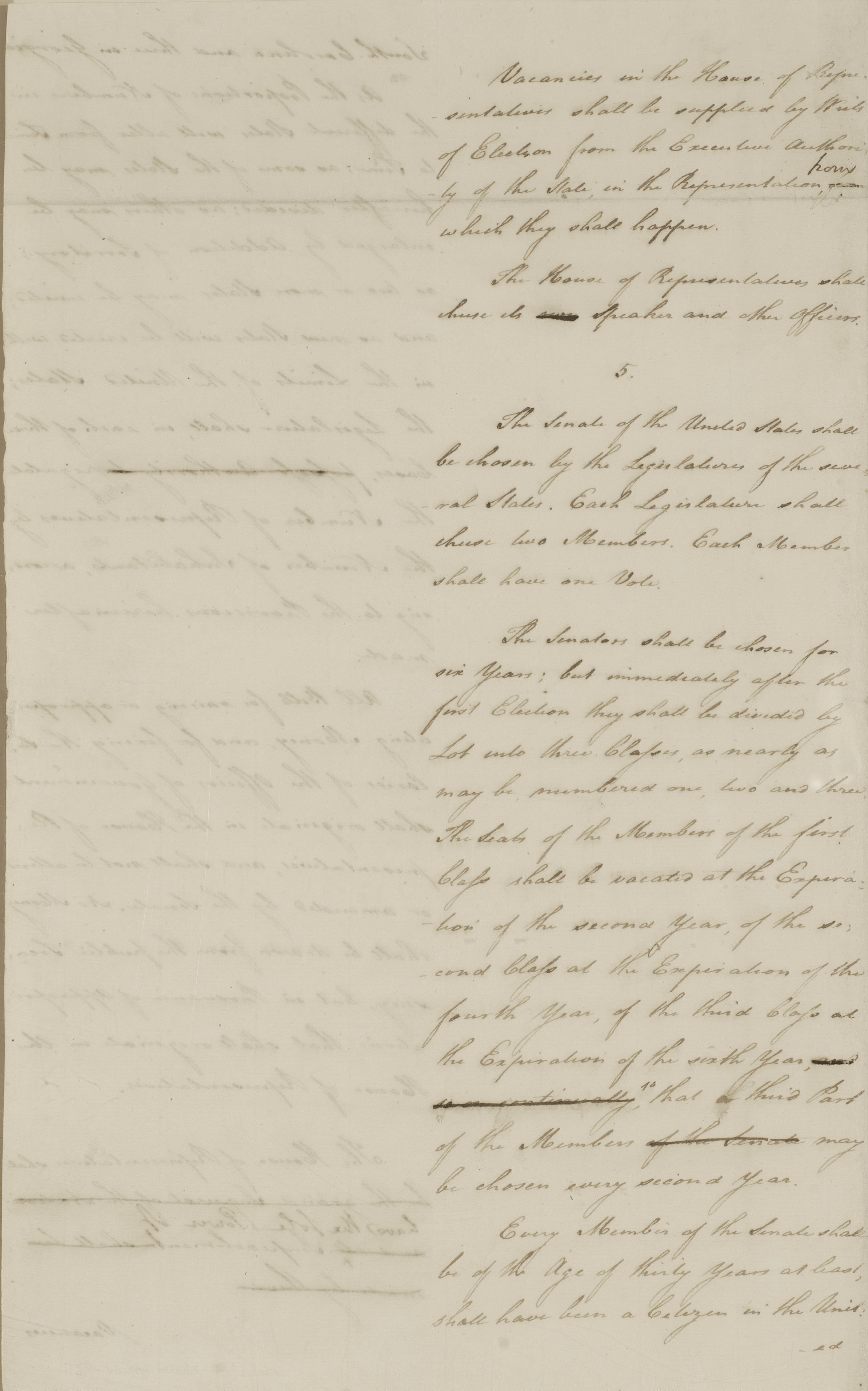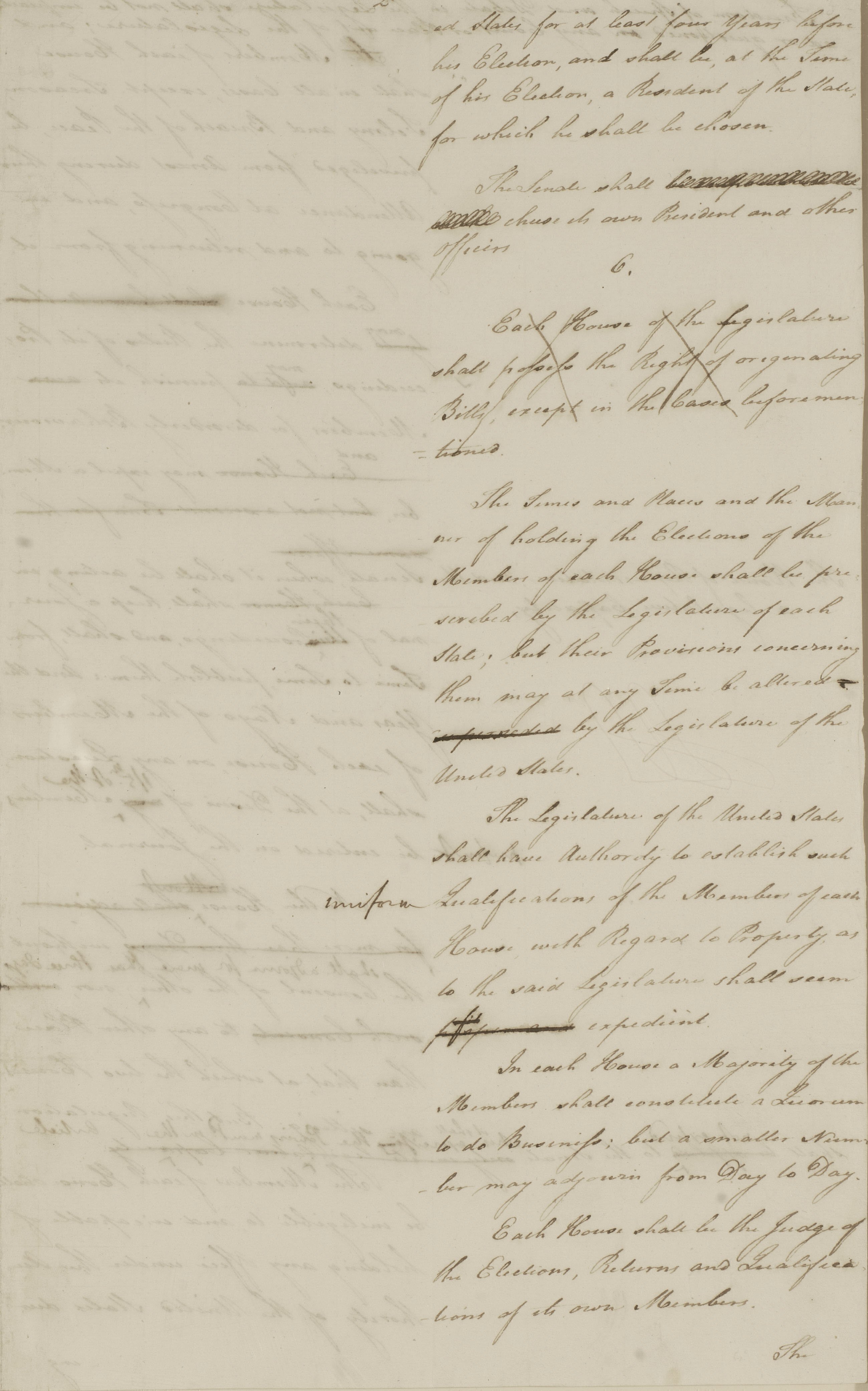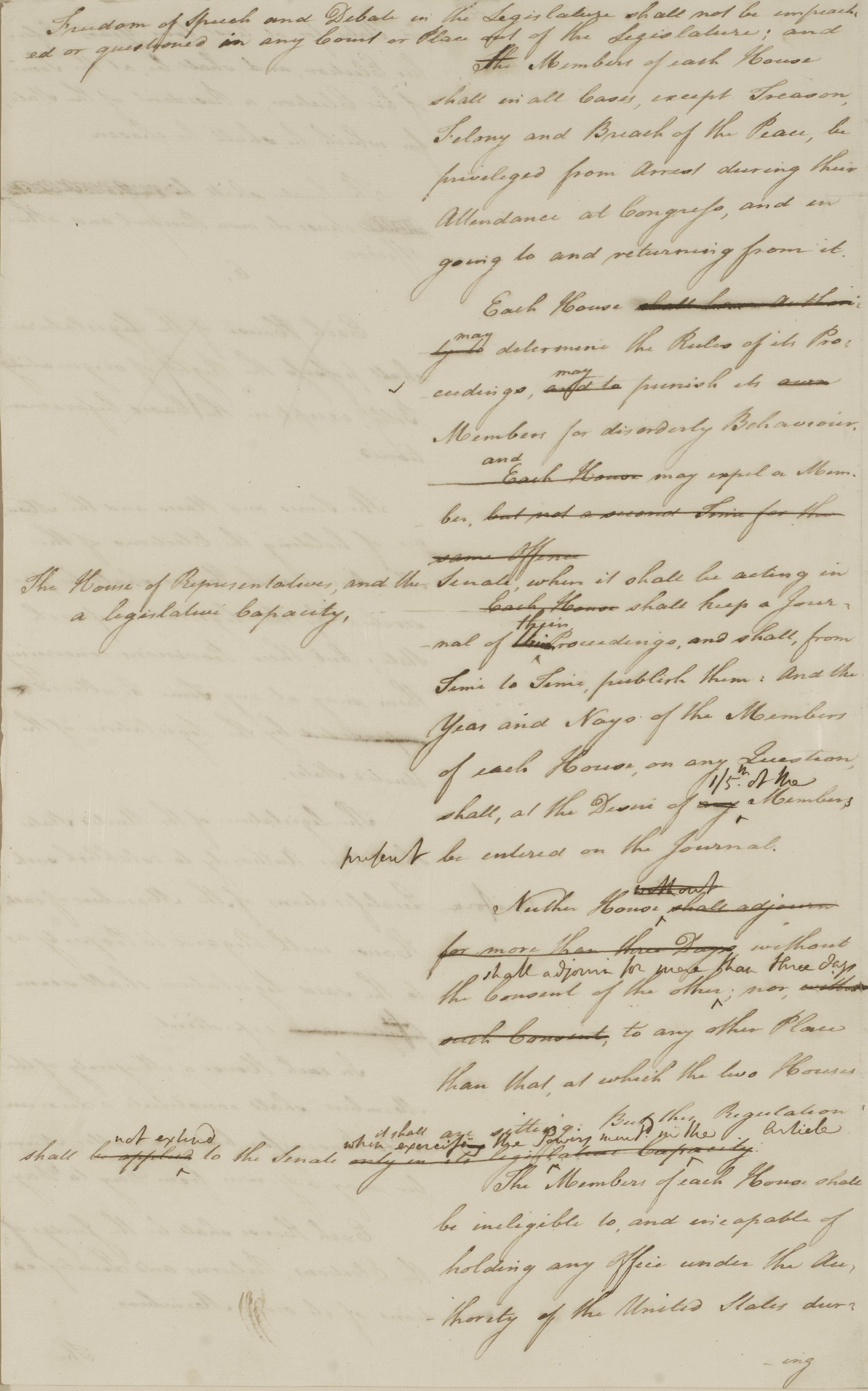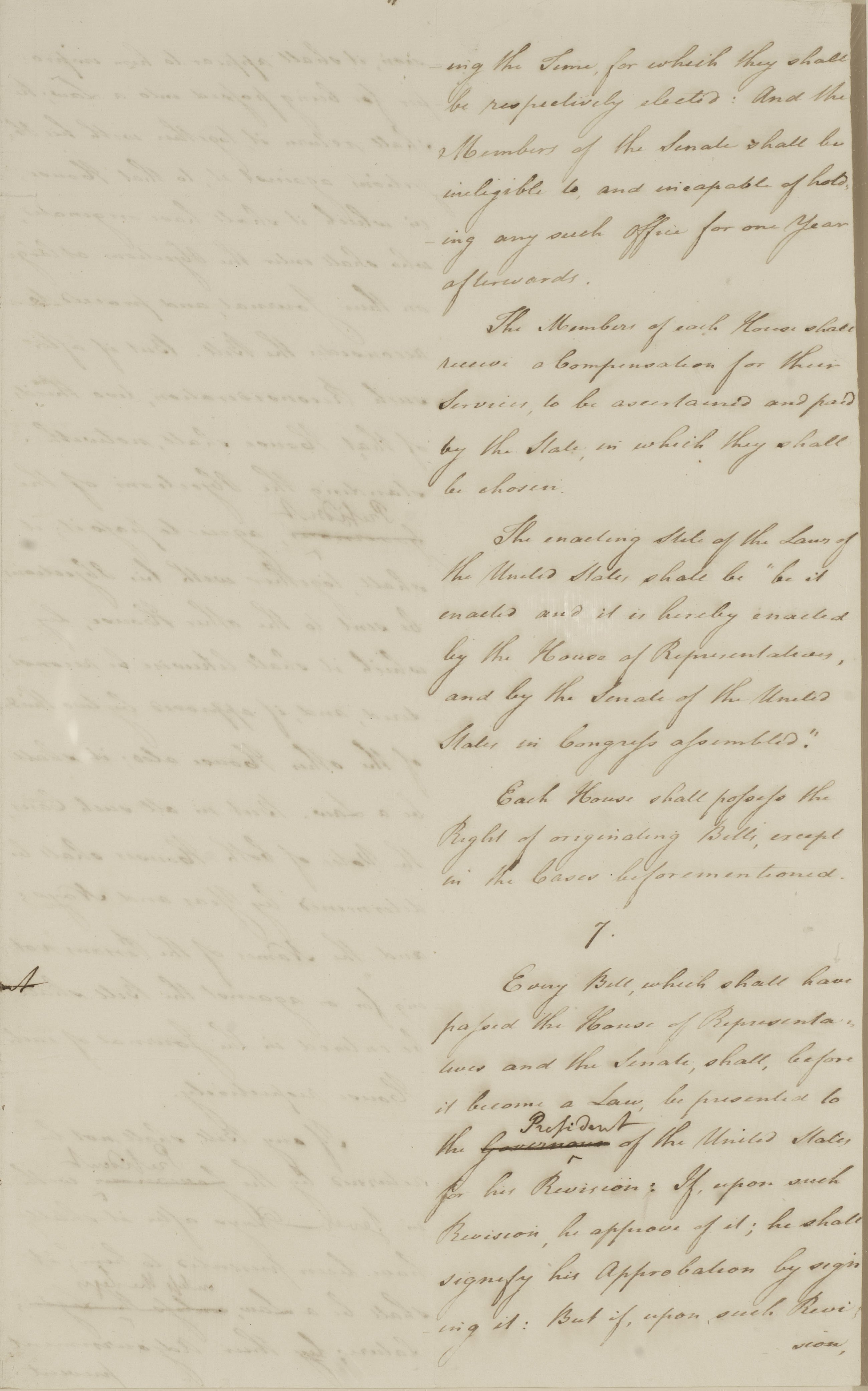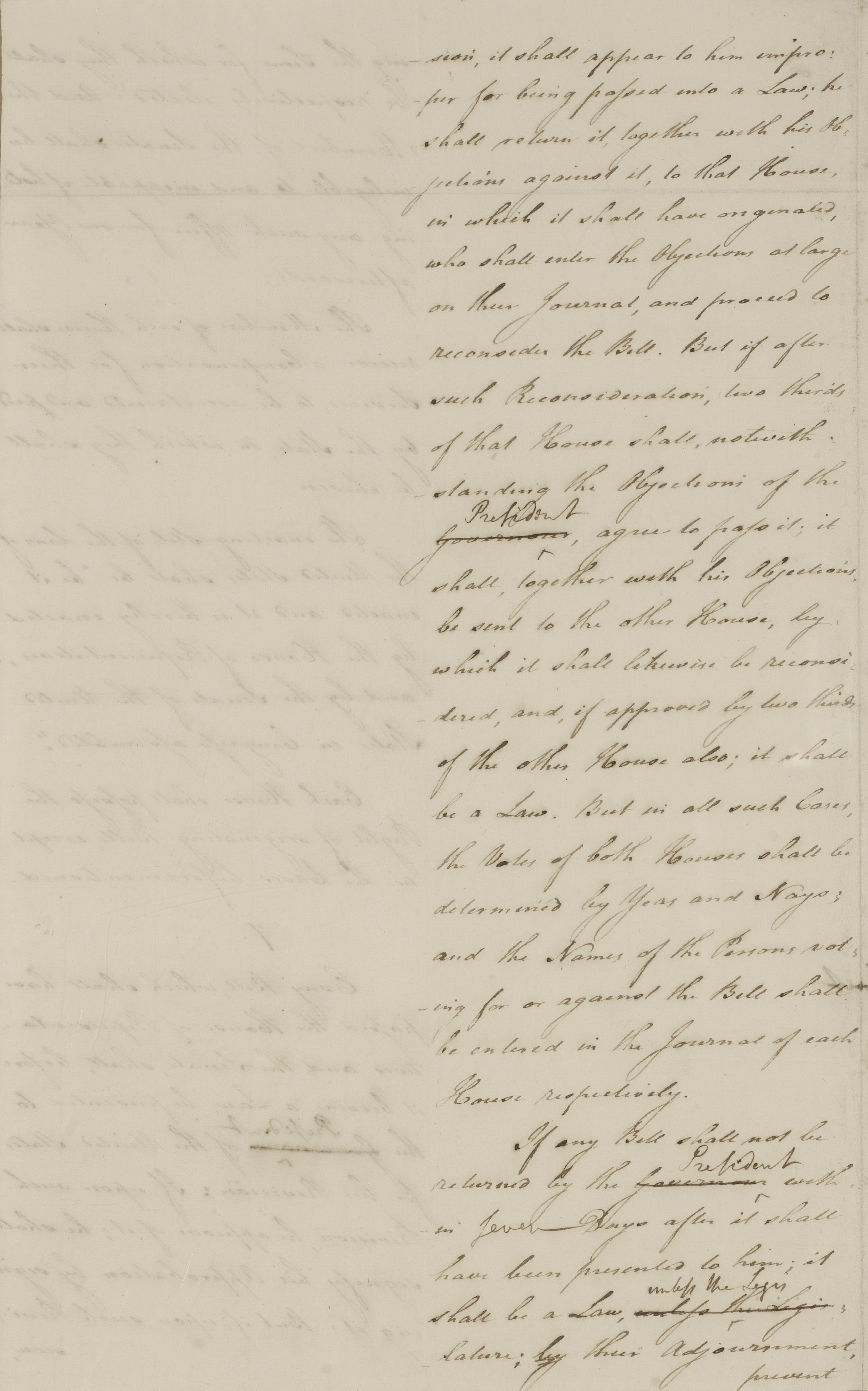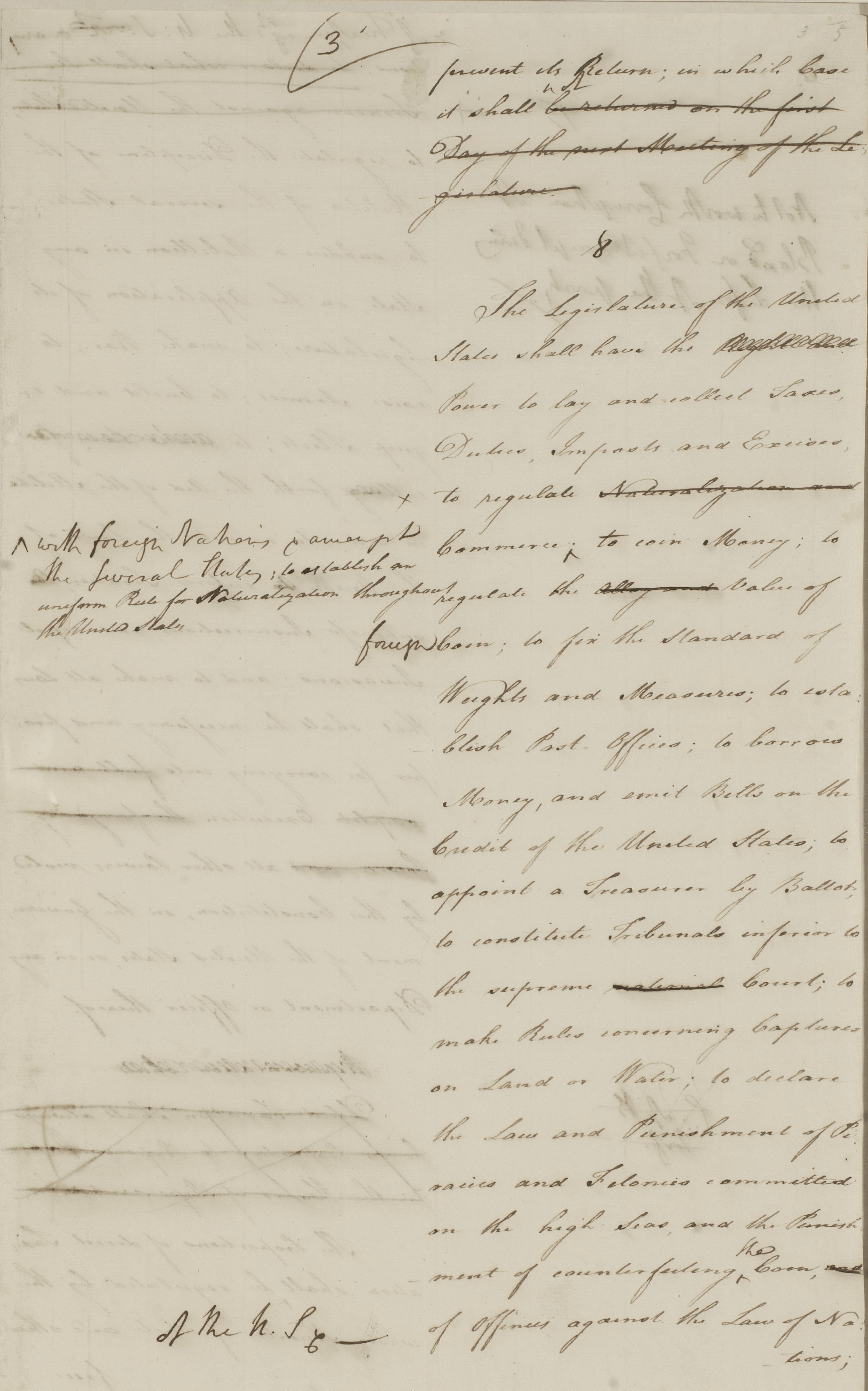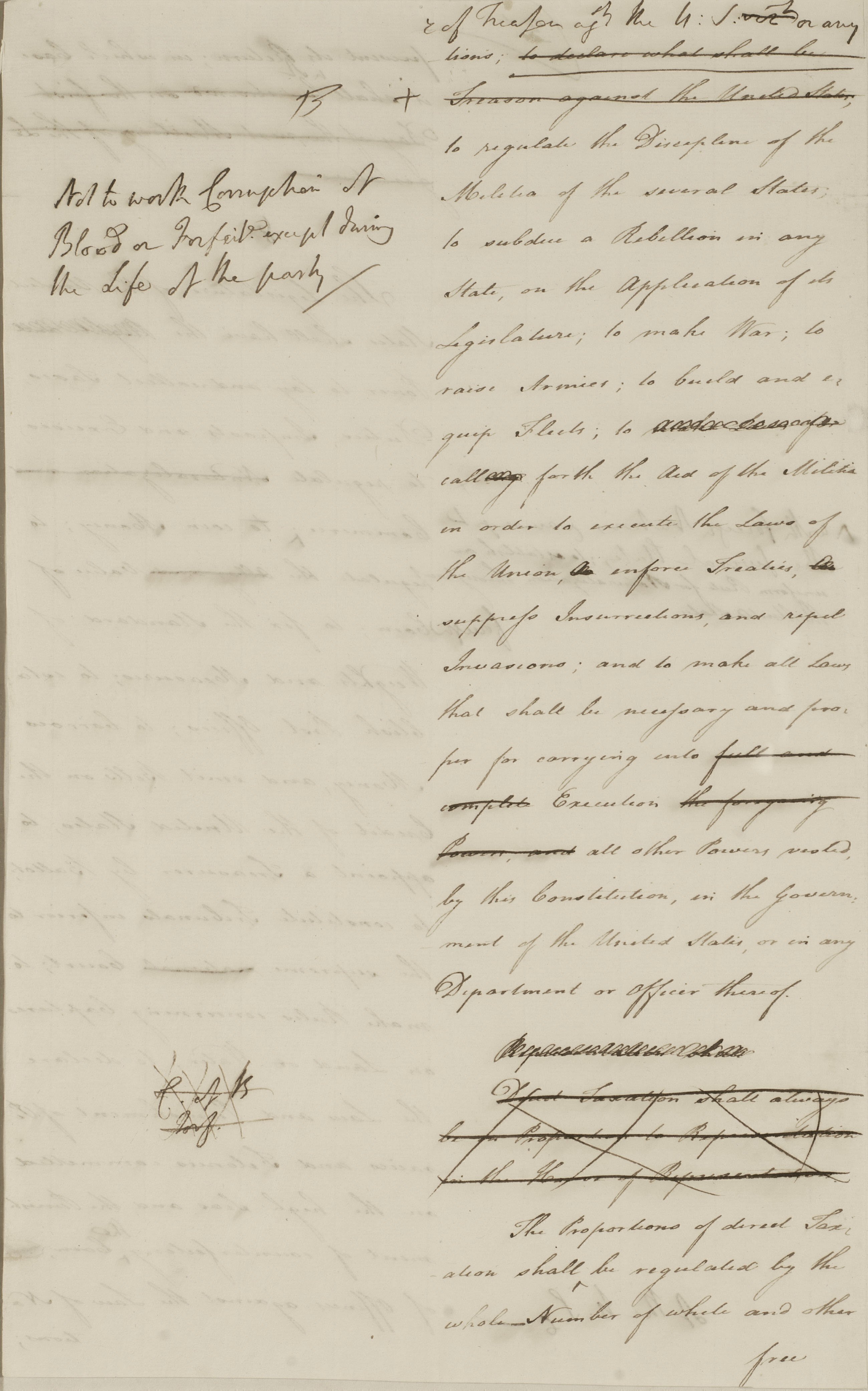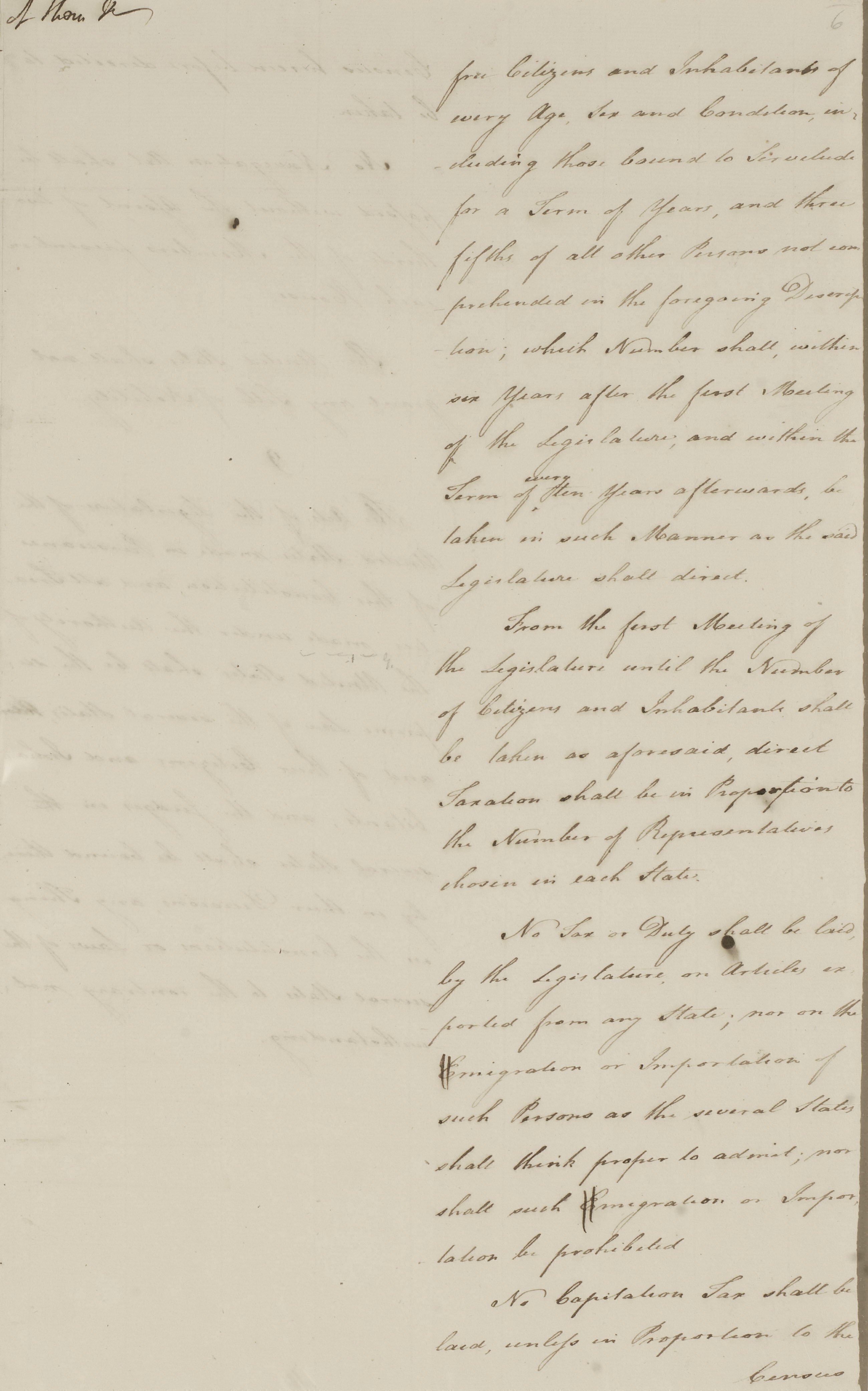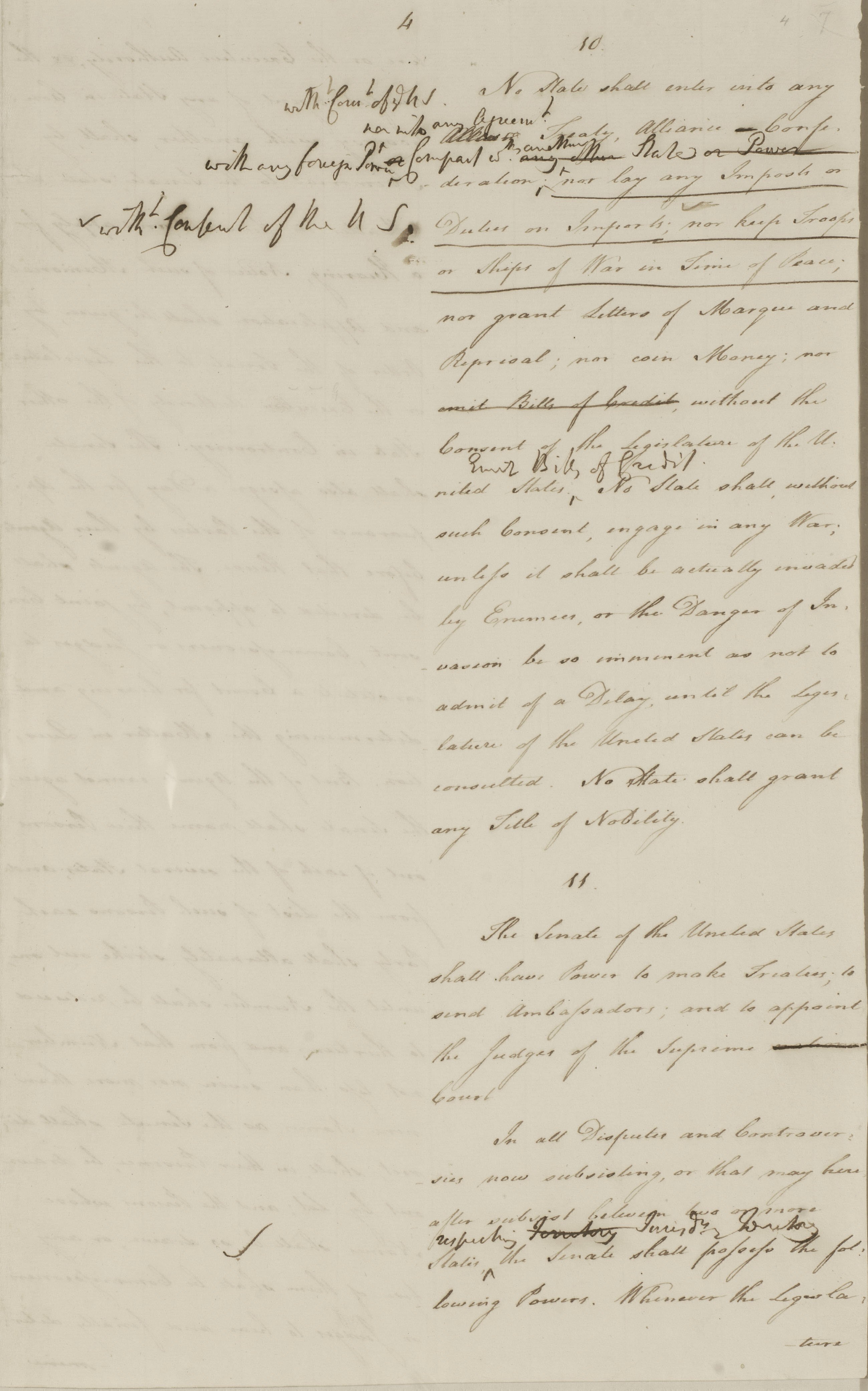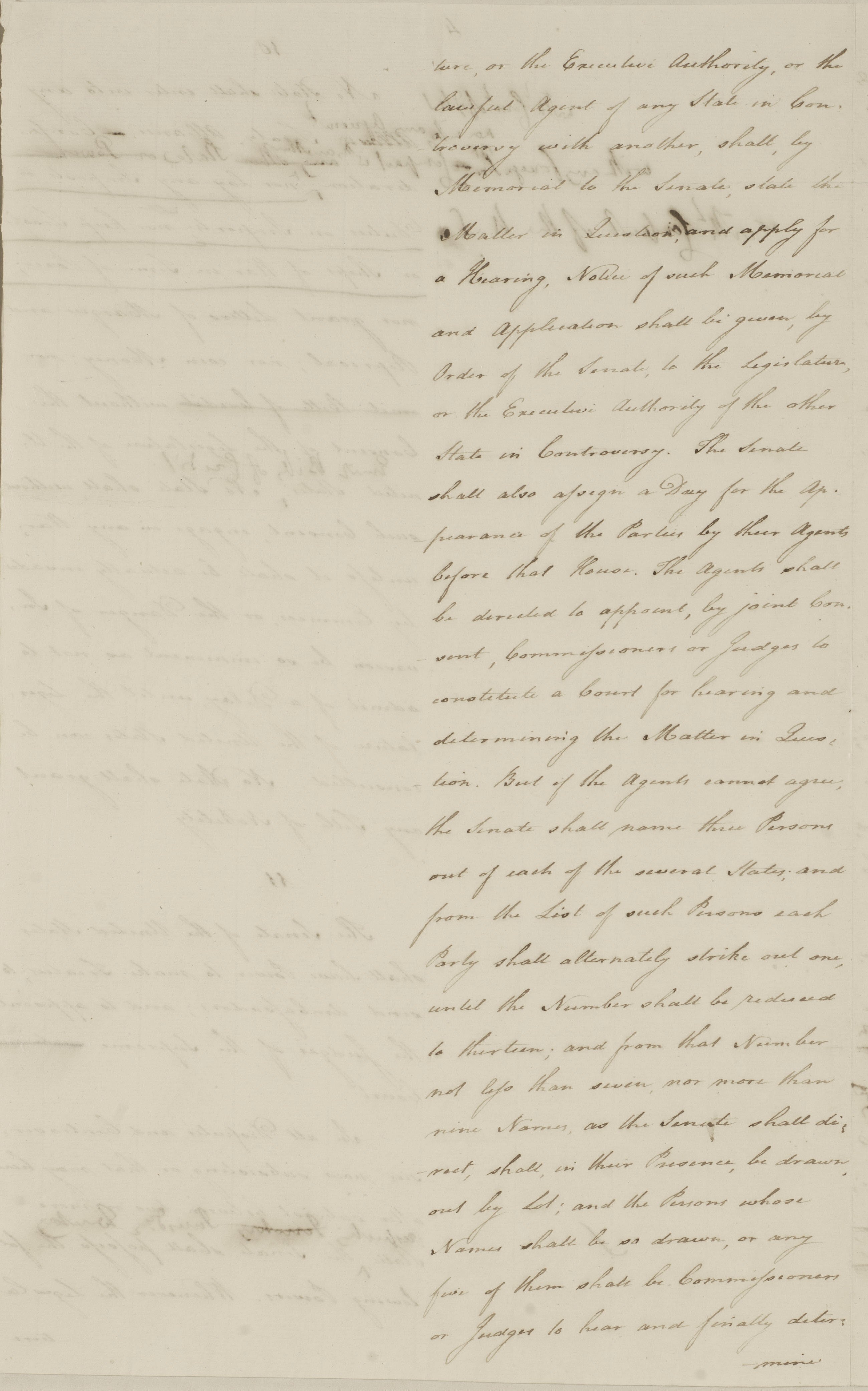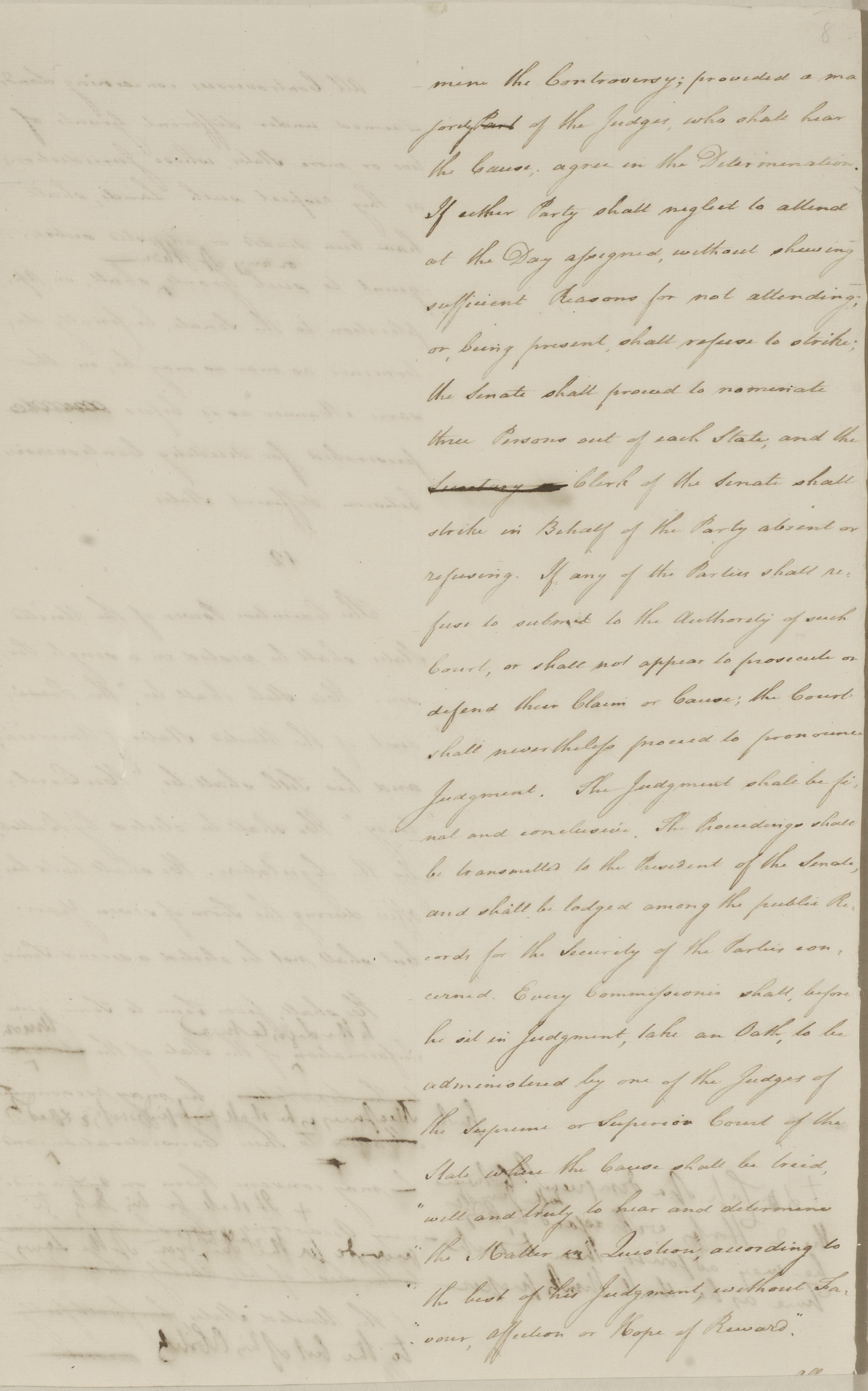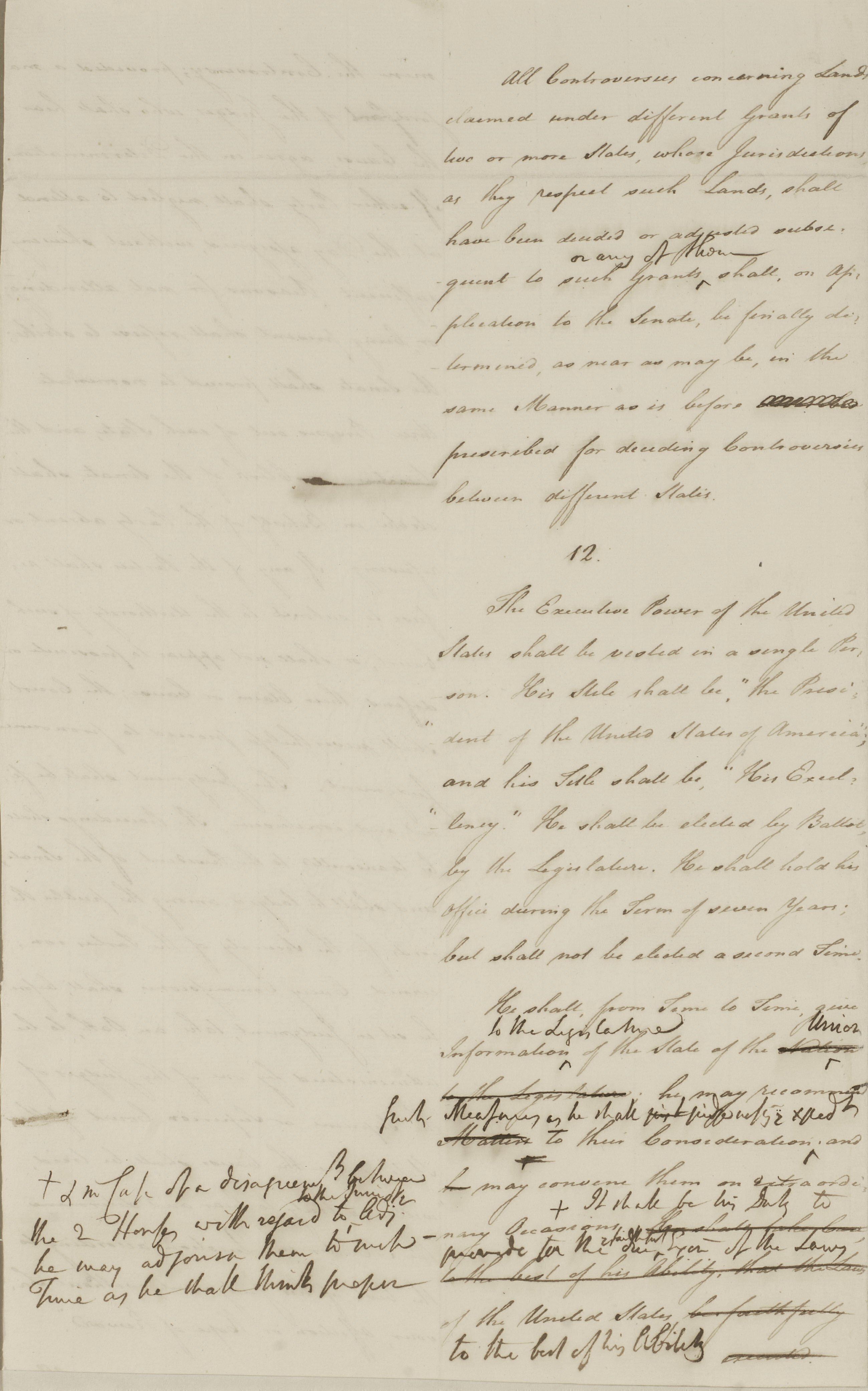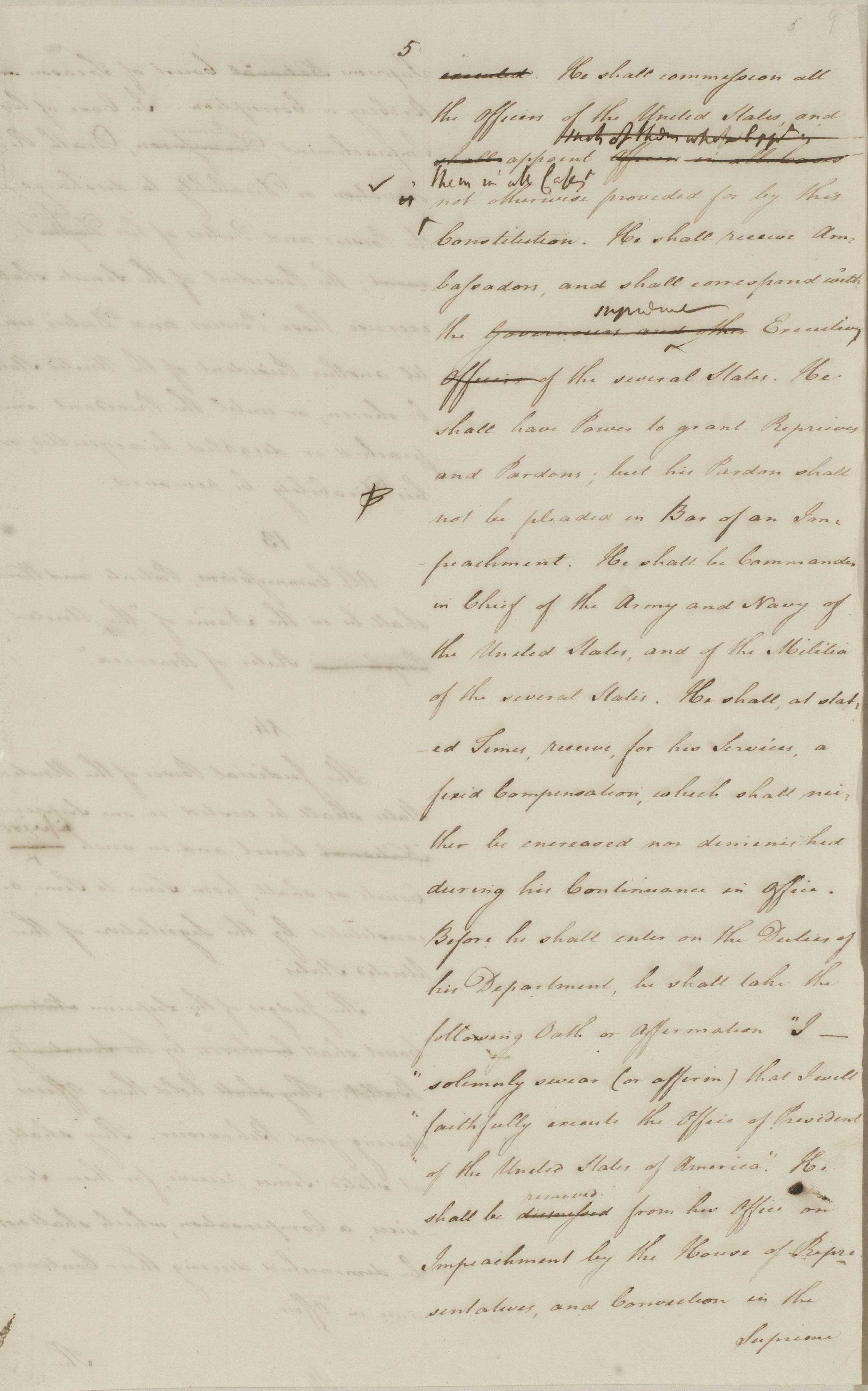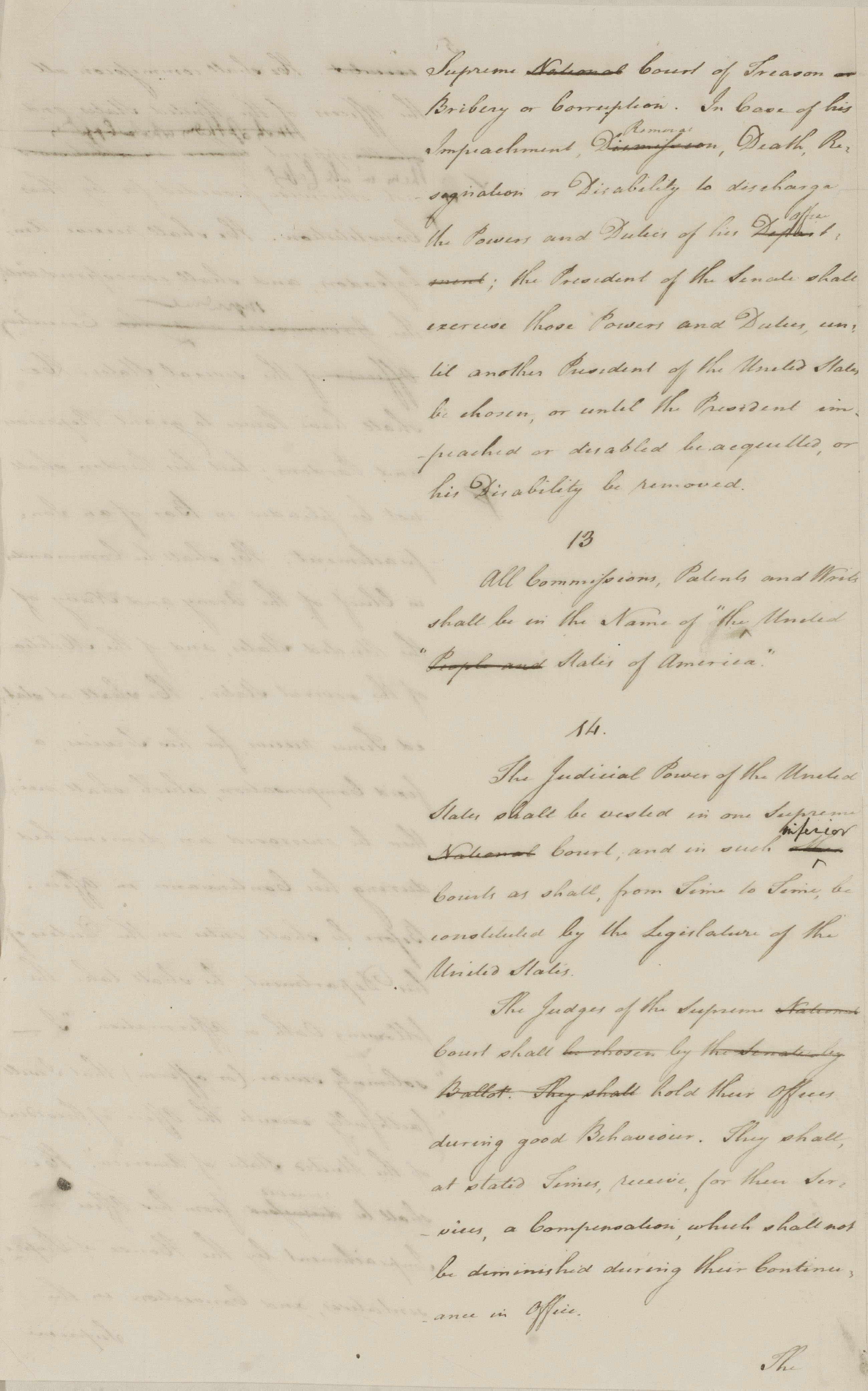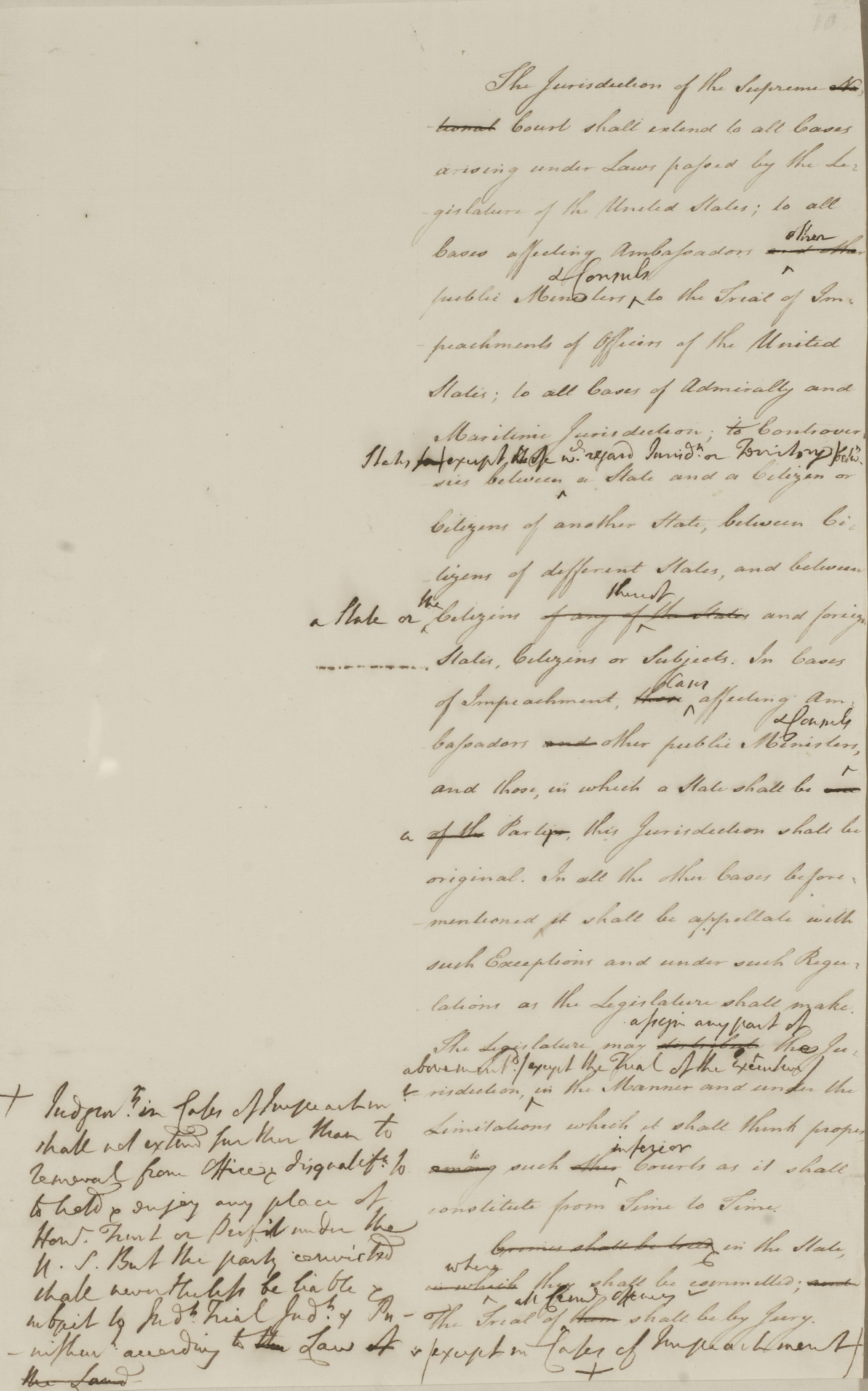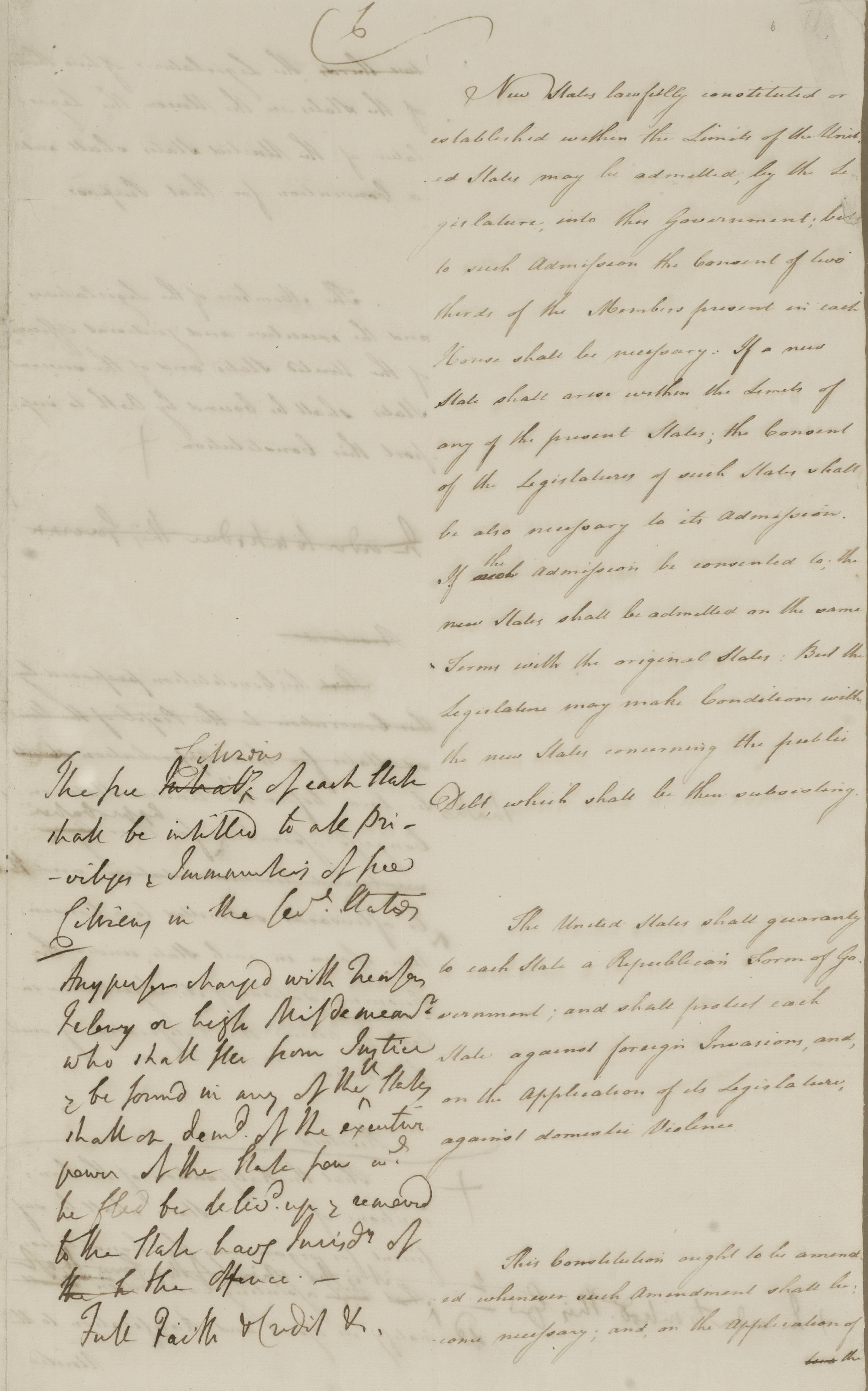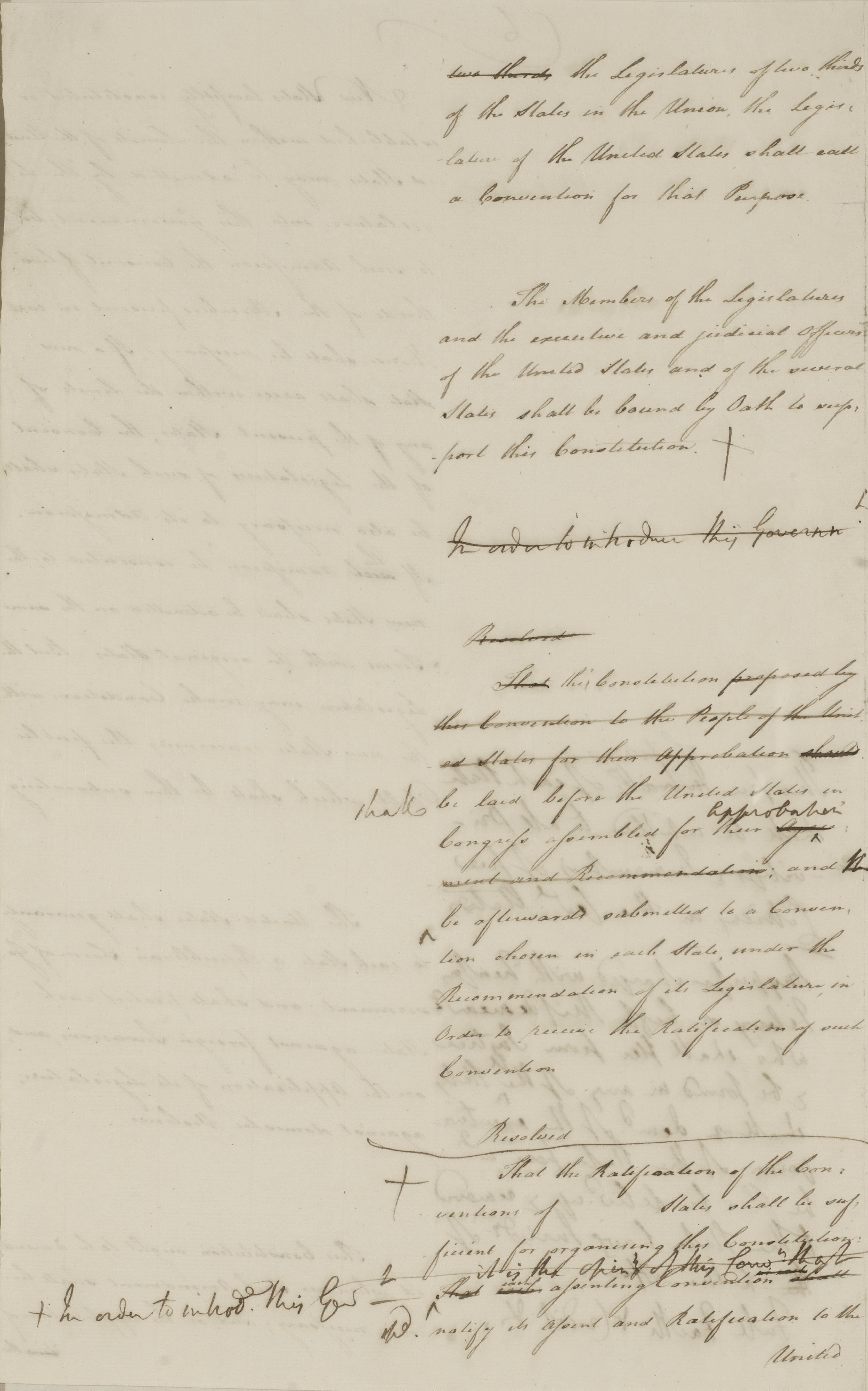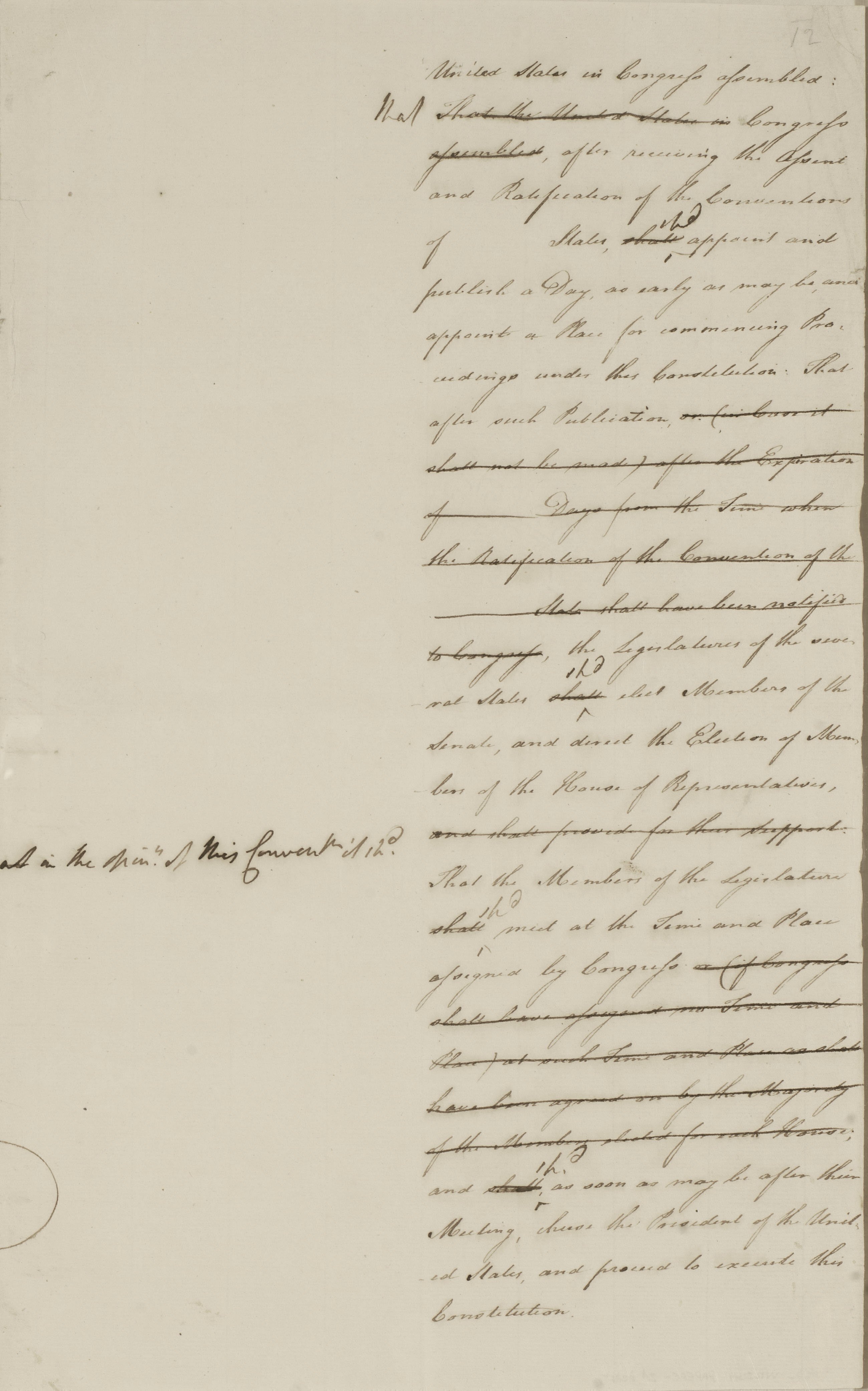Manuscript of the Committee of Detail Report
August 3, 1787
James Wilson wrote this document while serving on the Committee of Detail. Consisting of five members, the committee used the previously adopted resolutions and proposals to begin its work—making many edits and additions to create this preliminary draft of the Constitution.
We the People of the States of New-Hampshire, Massachusetts, Rhode-Island and Providence Plantations, Connecticut, New York, New Jersey, Pennsylvania, Delaware, Maryland, Virginia, North. Carolina, South. Carolina and Georgia do ordain, declare and establish the following Constitution for the Government of ourselves and of our Posterity
1.
The Stile of this Government shall be “the United State[‘?]s of America.”
2.
The Government shall consist of supreme legislative, executive and judicial Powers.
3.
The legislative Power shall be vested in a Congress to consist of two separate and distinct Bodies of Men, a House of Representatives, and a Senate; each of which shall, in all Cases, have a Negative on the other. To meet on the 1st Monday in every December —
4.
The Members of the House of Representatives shall be chosen every second Year, by the People of the several States comprehended within this Union. The Qualifications of the Electors shall be the same from Time to Time as those of the Electors, in the several States, of the most numerous Branch of their own Legislatures
Every Member of the House of Representatives shall be of the Age of twenty five Years at least; shall have been a Citizen in the United States for at least three Years before his Election; and shall be, at the Time of his Election, a Resident of the State, in which he shall be chosen.
The House of Representatives shall, at its first Formation, and until the Number of Citizens and Inhabitants shall be taken in the Manner herein after described, consist of sixty five Members, of whom three shall be chosen in New-Hampshire, eight in Massachusetts, one in Rhode-Island and Providence Plantations, five in Connecticut, six in New-York, four in New-Jersey, eight in Pennsylvania, one in Delaware, six in Maryland, ten in Virginia, five in North-Carolina, five in South-Carolina and three in Georgia
As the Proportions of Numbers in the different States will alter from Time to Time; as some of the States may be hereafter divided; as others may be enlarged by Addition of Territory; as two or more States may be united; and as new States will be erected within the Limits of the United States; the Legislature shall, in each of these Cases, possess Authority to regulate the Number of Representatives by the Number of Inhabitants, according to the Provisions hereinafter made.
All Bills for raising or appropriating Money, and for fixing the Salaries of the Officers of Government shall originate in the House of Representatives, and shall not be altered or amended by the Senate. No Money shall be drawn from the public Treasury, but in Pursuance of Appropriations that shall originate in the House of Representatives.
The House of Representatives shall have the Sole Power of Impeachment
Vacancies in the House of Representatives shall be supplied by Writs of Election from the Executive Authority of the State, in the from Representation, from which they shall happen.
The House of Representatives shall chuse its Speaker and other Officers.
5.
The Senate of the United States shall be chosen by the Legislatures of the several States. Each Legislature shall chuse two Members. Each Member shall have one Vote.
The Senators shall be chosen for six Years; but immediately after the first Election they shall be divided by Lot into three Classes, as nearly as may be, numbered one, two and three. The Seats of the Members of the first Class shall be vacated at the Expiration of the second Year, of the second Class at the Expiration of the fourth Year, of the third Class at the Expiration of the so sixth Year, so that a third Part of the Members may be chosen every second Year.
Every Member of the Senate shall be of the Age of thirty Years at least, shall have been a Citizen in the United States for at least four Years before his Election, and shall be, at the time of his Election, a Resident of the State, for which he shall be chosen.
The Senate shall chuse its own President and other Officers
6.
The Times and Places and the Manner of holding the Elections of the Members of each House shall be prescribed by the Legislature of each State; but their Provisions concerning them may at any Time be altered by the Legislature of the United States.
The Legislature of the United States shall have Authority to establish such uniform Qualifications of the Members of each House, with Regard to Property, as to the said Legislature shall seem expedient.
In each House a Majority of the Members shall constitute a Quorum to do Business; but a smaller Number may adjourn from Day to Day.
Each House shall be the Judge of the Elections, Returns and Qualifications of its own Members. Freedom of Speech and Debate in the Legislature shall not be impeached or questioned in any Court or Place out of the Legislature; and Members of each House shall in all Cases, except Treason, Felony and Breach of the Peace, be privileged from Arrest during their Attendance at Congress, and in going to and returning from it.
Each House may determine the Rules of its Proceedings, may punish its Members for disorderly Behaviour and may expel a Member
The House of Representatives, and the Senate, when it shall be acting in a legislative Capacity, shall keep a Journal of their Proceedings, and shall, from Time to Time, publish them: And the Yeas and Nays of the Members of each House, on any Question, shall, at the Desire of 1/5th of the Members present be entered on the Journal.
Neither House without the Consent of the other shall adjourn for more than three days; nor to any other Place than that, at which the two Houses are sitting. But this Regulation Shall not extend to the Senate when it shall exercise the powers mentioned in the — Article
The Members of each House shall be ineligible to, and incapable of holding any Office under the Authority of the United States during the Time, for which they shall be respectively elected: And the Members of the Senate shall be ineligible to, and incapable of holding any such Office for one Year afterwards.
The Members of each House shall receive a Compensation for their Services, to be ascertained and paid by the State, in which they shall be chosen.
The enacting Stile of the Laws of the United States shall be “be it enacted and it is hereby enacted by the House of Representatives, and by the Senate of the United States in Congress assembled.”
Each House shall possess the Right of originating Bills, except in the Cases beforementioned.
7.
Every Bill, which shall have passed the House of Representatives and the Senate, shall, before it become a Law, be presented to the President of the United States for his Revision: If, upon such Revision, he approve of it; he shall signify his Approbation by signing it: But if, upon such Revision, it shall appear to him improper for being passed into a Law; he shall return it, together with his Objections against it, to that House, in which it shall have originated, who shall enter the Objections at large on their Journal, and proceed to reconsider the Bill. But if after such Reconsideration, two thirds of that House shall, notwithstanding the Objections of the President, agree to pass it; it shall, together with his Objections, be sent to the other House, by which it shall likewise be reconsidered, and, if approved by two thirds of the other House also; it shall be a Law. But in all such Cases, the Votes of both Houses shall be determined by Yeas and Nays; and the Names of the Persons voting for or against the Bill shall be entered in the Journal of each House respectively.
If any Bill shall not be returned by the President with in seven Days after it shall have been presented to him; it shall be a Law, unless the Legislature; by their Adjournment, prevent its Return; in which Case it shall not
8.
The Legislature of the United States shall have the Power to lay and collect Taxes, Duties, Imposts and Excises; to regulate Commerce with foreign Nations & amongst the Several States; to establish an uniform Rule for Naturalization throughout the United States; to coin Money; to regulate the Value of foreign Coin; to fix the Standard of Weights and Measures; to establish Post-Offices; to borrow Money, and emit Bills on the Credit of the United States; to appoint a Treasurer by Ballot; to constitute Tribunals inferior to the supreme Court; to make Rules concerning Captures on Land or Water; to declare the Law and Punishment of Piracies and Felonies committed on the high Seas, and the Punishment of counterfeiting the Coin, of the U.S. and of Offences against the Law of Nations; & of Treason against the U.S. or any of them Not to work Corruption of Blood or Forfeiture except during the Life of the party; to regulate the Discipline of the Militia of the several States; to subdue a Rebellion in any State, on the Application of its Legislature; to make War; to raise Armies; to build and equip Fleets; to calling forth the Aid of the Militia in order to execute the Laws of the Union, enforce Treaties; suppress Insurrections, and repel Invasions; and to make all Laws that shall be necessary and proper for carrying into Execution all other Powers vested, by this Constitution, in the Government of the United States, or in any Department or Officer thereof.
The Proportions of direct Taxation shall be regulated by the whole Number of white and other free Citizens and Inhabitants of every Age, Sex and Condition, including those bound to Servitude for a Term of Years, and three fifths of all other Persons not comprehended in the foregoing Description; which Number shall, within six Years after the first Meeting of the Legislature; and within the Term of every ten Years afterwards, be taken in such Manner as the said Legislature shall direct.
From the first Meeting of the Legislature until the Number of Citizens and Inhabitants shall be taken as aforesaid, direct Taxation shall be in Proportion to the Number of Representatives chosen in each State.
No Tax or Duty shall be laid, by the Legislature, on Articles exported from any State; nor on the Imigration or Importation of such Persons as the several States shall think proper to admit; nor shall such Imigration or Importation be prohibited No Capitation Tax shall be laid, unless in Proportion to the Census herein before directed to be taken.
No Navigation Act shall be passed without the Assent of two thirds of the Members present in each House.
The United States shall not grant any Title of Nobility.
9.
The Acts of the Legislature of the United States made in Pursuance of this Constitution, and all Treaties made under the Authority of the United States shall be the supreme Law of the several States, and of their Citizens and Inhabitants; and the Judges in the several States shall be bound thereby in their Decisions, any Thing in the Constitutions or Laws of the several States to the contrary notwithstanding.
10.
No State shall enter into any Agreement, Treaty, Alliance Confederation with any foreign Power without consent of the US nor into any Compact with another State without Consent of the US; nor lay any Imposts or Duties on Imports; nor keep Troops or Ships of War in Time of Peace; nor grant Letters of Marque and Reprisal; nor coin Money; nor without the Consent of the Legislature of the United States Emit Bills of Credit. No State shall, without such Consent, engage in any War; unless it shall be actually invaded by Enemies, or the Danger of Invasion be so imminent as not to admit of a Delay, until the Legislature of the United States can be consulted. No State shall grant any Title of Nobility.
11.
The Senate of the United States shall have Power to make Treaties; to send Ambassadors; and to appoint the Judges of the Supreme Court
In all Disputes and Controversies now subsisting, or that may hereafter subsist between two or more States respecting [Jurisdiction or Territory?], the Senate shall possess the following Powers. Whenever the Legislature, or the Executive Authority, or the lawful Agent of any State in Controversy with another, shall, by Memorial to the Senate, state the Matter in Question, and apply for a Hearing, Notice of such Memorial and Application shall be given, by Order of the Senate, to the Legislature or the Executive Authority of the other State in Controversy. The Senate shall also assign a Day for the Appearance of the Parties by their Agents before that House. The Agents shall be directed to appoint, by joint Consent, Commissioners or Judges to constitute a Court for hearing and determining the Matter in Question. But if the Agents cannot agree; the Senate shall name three Persons out of each of the several States; and from the List of such Persons each Party shall alternately strike out one, until the Number shall be reduced to thirteen; and from that Number not less than seven, nor more than nine Names, as the Senate shall direct, shall, in their Presence, be drawn out by Lot; and the Persons whose Names shall be so drawn, or any five of them shall be Commissioners or Judges to hear and finally determine the Controversy; provided a majority Part of the Judges, who shall hear the Cause, agree in the Determination. If either Party shall neglect to attend at the Day assigned, without shewing sufficient Reasons for not attending; or, being present, shall refuse to strike; the Senate shall proceed to nominate three Persons out of each State; and the Clerk of the Senate shall strike in Behalf of the Party absent or refusing. If any of the Parties shall refuse to submit to the Authority of such Court, or shall not appear to prosecute or defend their Claim or Cause; the Court shall nevertheless proceed to pronounce Judgment. The Judgment shall be final and conclusive. The Proceedings shall be transmitted to the President of the Senate, and shall be lodged among the public Records for the Security of the Parties concerned. Every Commissioner shall, before he sit in Judgment, take an Oath, to be administered by one of the Judges of the Supreme or Superior Court of the State where the Cause shall be tried, “well and truly to hear and determine the Matter in Question, according to the best of his Judgment, without Favour, Affection or Hope of Reward.”
All Controversies concerning Lands claimed under different Grants of two or more States, whose Jurisdictions as they respect such Lands, shall have been decided or adjusted subsequent to such Grants or any of them shall, on Application to the Senate, be finally determined, as near as may be, in the same Manner as is before prescribed for deciding Controversies between different States.
12.
The Executive Power of the United States shall be vested in a single Person. His Stile shall be, “the President of the United States of America”; and his Title shall be, “His Excellency.” He shall be elected by Ballot by the Legislature. He shall hold his Office during the Term of seven Years; but shall not be elected a second Time.
He shall, from Time to Time, give Information to the Legislature of the State of the Union; he may recommend to their Consideration, such Measures as he shall [find necessary & expedient] and he may convene them on extraordinary Occasions. & in Case of a disagreement between the 2 Houses with regard to the time of Adjournment he may adjourn them to such Time as he shall think proper. It shall be his Duty to provide for the due & faithful Execution of the Laws of the United States to the best of his Ability He shall commission all the Officers of the United States, and appoint them in all Cases not otherwise provided for by this Constitution. He shall receive Ambassadors, and shall correspond with the Supreme Executives of the several States. He shall have Power to grant Reprieves and Pardons; but his Pardon shall not be pleaded in Bar of an Impeachment. He shall be Commander in Chief of the Army and Navy of the United States, and of the Militia of the several States. He shall, at stated Times, receive, for his Services, a fixed Compensation, which shall neither be increased nor diminished during his Continuance in Office. Before he shall enter on the Duties of his Department, he shall take the following Oath or Affirmation “I____ solemnly swear (or affirm) that I will faithfully execute the Office of President of the United States of America.” He shall be removed from his Office on Impeachment by the House of Representatives, and Conviction in the Supreme Court of Treason or Bribery or Corruption. In Case of his Impeachment, Removal, Death, Resignation or Disability to discharge the Powers and Duties of his Office; the President of the Senate shall exercise those Powers and Duties, until another President of the United States be chosen, or until the President impeached or disabled be acquitted, or his Disability be removed.
13.
All Commissions, Patents and Writs shall be in the Name of “the United States of America.”
14.
The Judicial Power of the United States shall be vested in one Supreme Court, and in such inferior Courts as shall, from Time to Time, be constituted by the Legislature of the United States.
The Judges of the Supreme Court shall hold their Offices during good Behaviour. They shall, at stated Times, receive, for their Services, a Compensation, which shall not be diminished during their Continuance in Office.
The Jurisdiction of the Supreme Court shall extend to all Cases arising under Laws passed by the Legislature of the United States; to all Cases affecting Ambassadors, other public Ministers & consuls to the Trial of Impeachments of Officers of the United States; to all Cases of Admiralty and Maritime Jurisdiction; Controversies between States except those which regard Jurisdiction to or Territory, between a State and a Citizen or Citizens of another State, between Citizens of different States, and between a State or the Citizens thereof and foreign States, Citizens or Subjects. In Cases of Impeachment, Cases affecting Ambassadors and other public Ministers & Consuls, and those, in which a State shall be a Party, this Jurisdiction shall be original. In all the other Cases beforementioned, it shall be appellate with such Exceptions and under such Regulations as the Legislature shall make. The Legislature may assign any part of the Jurisdiction, above mentioned/ except the Trial of the Executive/ in the Manner and under the Limitations which it shall think proper to such inferior Courts as it shall constitute from Time to Time.
& in the State, where they shall be committed; The Trial of all Criminal Offences shall be by Jury. /except in Cases of Impeachment/
Judgments in Cases of Impeachment shall not extend further than to Removal from Office & disqualification [to] to hold & enjoy any place of Honour Trust or Profit under the U.S. But the party convicted shall nevertheless be liable & subject to Indictment, Trial, Judgment & Punishment according to Law.
The free Citizens of each State shall be intitled to all Privileges & Immunities of free Citizens in the several States
Any person charged with Treason Felony or high Misdemeanor who shall flee from Justice & be found in any of the States shall on demand of the executive power of the State from which he fled be delivered up & removed to the State having Jurisdiction of the Offence.
Full Faith & Credit &c.
New States lawfully constituted or established within the Limits of the United States may be admitted, by the Legislature, into this Government; but to such Admission the Consent of two thirds of the Members present in each House shall be necessary: If a new State shall arise within the Limits of any of the present States; the Consent of the Legislatures of such States shall be also necessary to its Admission. If the Admission be consented to; the new States shall be admitted on the same Terms with the original States: But the Legislature may make Conditions with the new States concerning the public Debt, which shall be then subsisting.
The United States shall guaranty to each State a Republican Form of Government; and shall protect each State against foreign Invasions, and, on the Application of its Legislature, against domestic Violence.
This Constitution ought to be amended whenever such Amendment shall become necessary; and, on the Application of the Legislatures of two thirds of the States in the Union, the Legislature of the United States shall call a Convention for that Purpose.
The Members of the Legislatures and the executive and judicial Officers of the United States and of the several States shall be bound by Oath to support this Constitution.
this Constitution shall be laid before the United States in Congress assembled for their Approbation; and that in the opinion of this Convention it should be afterwards submitted to a Convention chosen in each State, under the Recommendation of its Legislature, in Order to receive the Ratification of such Convention
Resolved
That the Ratification of the Conventions of — States shall be sufficient for organizing this Constitution:
In order to introduce this Government it is the Opinion of this Convention that each assenting Convention should notify its Assent and Ratification to the United States in Congress assembled: that Congress, after receiving the Assent and Ratification of the Conventions of — States, should appoint and publish a Day, as early as may be, and appoint a Place for commencing Proceedings under this Constitution: That after such Publication, the Legislatures of the several States should elect Members of the Senate, and direct the Election of Members of the House of Representatives. That the Members of the Legislature should meet at the Time and Place assigned by Congress; and should, as soon as may be after their Meeting, chuse the President of the United States, and proceed to execute this Constitution.





